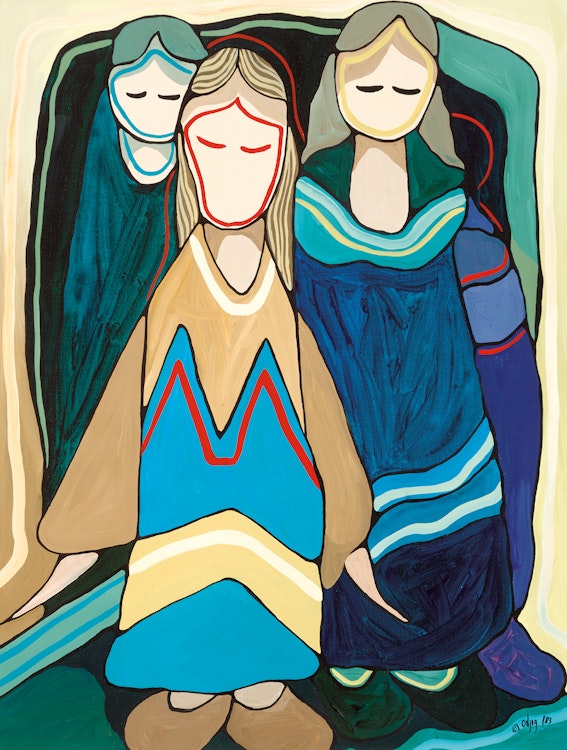Siblings by Daphne Odjig

Daphne Odjig
Siblings
acrylic on canvas
signed and dated 1983 lower right; signed, titled and dated on the reverse
34 x 26 ins ( 86.4 x 66 cms )
Auction Estimate: $15,000.00 - $20,000.00
Price Realized $14,400.00
Sale date: June 8th 2023
Mayberry Fine Art, Winnipeg
Private Collection, WInnipeg
“Celebrating Canadian Women Artists”, Mayberry Fine Art, 1-18 March 2023
Odjig became a key figure among the movement of Indigenous artists that gradually gained recognition in the Canadian art world of the 1970s. In 1973, she co-founded the Professional Native Indian Artists Association (colloquially called the “Indian Group of Seven”). The following year, she opened the Warehouse Gallery in Winnipeg. Odjig also taught at the Manitou Arts Foundation on Schrieber Island in Georgian Bay. These varied projects helped place Odjig at the forefront of cultural activity supporting and promoting Indigenous visual artists during a crucial period.
“Siblings” demonstrates Odjig’s idiosyncratic mature style. Odjig’s simplified figures are portrayed with the use flowing lines and flat planes of colour. The round forms in the background envelope the figures, emphasizing their familial unity. Bold red lines strike an energizing contrast with the blue and earthy tones. With her distinct and personal aesthetic, Odjig powerfully incorporated her Odawa-Potawatomi culture and histories into the visual culture of Canadian art.
Share this item with your friends
Daphne Odjig
(1919 - 2016) R.C.A., O.C., G.G.A.
Born and raised in the village of Wikwemikong, on Manitoulin Island, Daphne Odjig has strong traditional roots in her Native culture (she is Potawatomi, Odawa, and English) and is proud of the artistic tradition of her ancestors. Her grandfather, Jonas Odjig, carved tombstones for the nearby church and later sketched and painted church landscapes. Her father painted war scenes and portraits of soldiers from the Great War and was a talented musician.
Bob Boyer notes that "Daphne often claims that she is not part of the New Woodland school" in that her works incorporated the importance of womanhood and sense of family, while others in the New Woodland group "concerned themselves with a spiritual quest." Her work also differed in that she was influenced by Picasso's cubism but within an Aboriginal context. She was attracted to the cubist style because of its "disregard for perspectival space, its skewing of the elements and relationships of reality, and its central compositional structure."
In 1972, Odjig's art took her to Winnipeg and a pivotal exhibition, "Treaty Numbers 23, 287 and 1171," at the Winnipeg Art Gallery. The exhibition featured her work along with the work of Jackson Beardy and Alex Janvier. This was the first time Native artists were featured in a Canadian public art gallery rather than a museum. Daphne was the only Native woman artist facing this struggle in the early years, a situation made all the more difficult because she was a self-taught artist and, as a result, not respected at that time.
In 1973, she co-founded the Professional Native Indian Artists Association (colloquially called the "Indian Group of Seven"). This group included Daphne, Jackson Beardy, Carl Ray, Joseph Sanchez, Eddy Cobiness, Norval Morrisseau and Alex Janvier. Daphne was the first and only woman to be a part of this group. Later, in 1974, Daphne and Chester opened the Warehouse Gallery in Winnipeg, a huge venture that provided support for emerging Native artists. Odjig was honoured with the order of Canada in 1986 and was elected a member of the Royal Canadian Academy in 1989. She received the Governer General’s Award for Visual Arts from Governor General Michaell Jean in 2007. Odjig lived in Anglemont, British Columbia for a number of years and in Kelowna until her passing in 2016.

